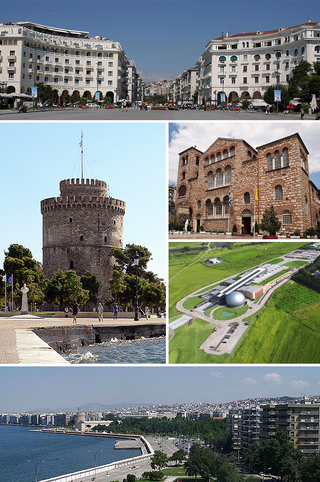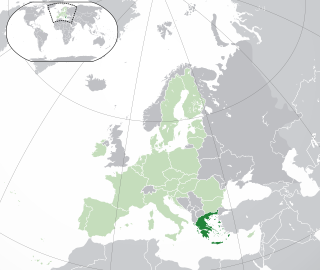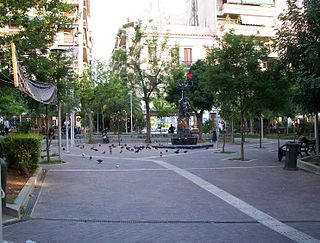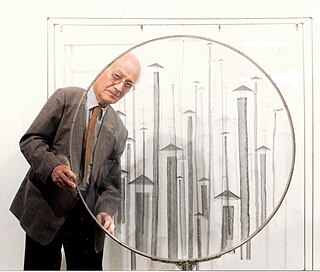
Athens is the capital and largest city of Greece. A major coastal urban area in the Mediterranean, Athens is also the capital of the Attica region and is the southernmost capital on the European mainland. With its urban area's population numbering over three million, it is the eighth largest urban area in the European Union. The Municipality of Athens, which constitutes a small administrative unit of the entire urban area, had a population of 643,452 (2021) within its official limits, and a land area of 38.96 km2 (15.04 sq mi).

Thessaloniki, also known as Thessalonica, Saloniki, Salonika, or Salonica, is the second-largest city in Greece, with slightly over one million inhabitants in its metropolitan area, and the capital of the geographic region of Macedonia, the administrative region of Central Macedonia and the Decentralized Administration of Macedonia and Thrace. It is also known in Greek as "η Συμπρωτεύουσα", literally "the co-capital", a reference to its historical status as the Συμβασιλεύουσα or "co-reigning" city of the Byzantine Empire alongside Constantinople.

Athens is one of the oldest named cities in the world, having been continuously inhabited for perhaps 5,000 years. Situated in southern Europe, Athens became the leading city of Ancient Greece in the first millennium BC, and its cultural achievements during the 5th century BC laid the foundations of Western civilization.

Nikos Dimou is a Greek writer and columnist and copywriter.

Lesbian, gay, bisexual, and transgender (LGBT) rights in Greece are regarded as the most advanced in Southeast Europe and among all the neighboring countries. Public opinion on homosexuality in Greece is generally regarded as culturally liberal, with civil partnerships being legally recognised since 2015 and same-sex marriage since 16 February 2024.
Anarchism in Greece traces its roots to ancient Greece but was formed as a political movement during the 19th century. It was in the ancient era that the first libertarian thoughts appeared when philosophers based on rationality questioned the fundamentals of tradition. Modern anarchism in Greece emerged in the 19th century, heavily influenced by the contemporary European classical anarchism. Because of the Bolshevik success in the Russian Revolution of 1917 and the rise of the Communist Party, anarchism faded after the first decades of the 20th century. The collapse of the military junta put an end to the monopoly of the political power from the Right, whereas the dissolution of the Soviet Union diminished the allure of the Communist Party of Greece allowing anarchist groups to gain pace in Athens and other cities.

Exarcheia is a community in central Athens, Greece close to the historical building of the National Technical University of Athens. Exarcheia took its name from a 19th-century businessman named Exarchos who opened a large general store there. Exarcheia is bordered on the east by Kolonaki and is framed by Patission Street, Panepistimiou Street and Alexandras Avenue. Exarcheia is known for being Athens' historical core of radical political and intellectual activism. Exarcheia is often considered the anarchist quarter of Athens, known for its radical democracy.
Kostis Papagiorgis was a Greek essayist, columnist and translator of philosophical studies.
IANOS SA is a Greek-based book, music and art retailer with several stores in the two major cities, Thessaloniki and Athens. It was named after the ancient Roman god Janus as a link to the identity and mission of the company. IANOS sells through its concept-store chain a large variety of books, CDs, art objects, periodicals, gifts and stationery. Also, it offers event venues, seminars, art galleries, a publishing house, and an art café. It operates web sales and runs an internet radio.

Athens Voice is a media company that includes the printed Athens Voice paper, the digital publication athensvoice.gr, the radio station Athens Voice Radio 102.5 and Athens Voice Books.

The anti-austerity movement in Greece involved a series of demonstrations and general strikes that took place across the country. The events, which began on 5 May 2010, were provoked by plans to cut public spending and raise taxes as austerity measures in exchange for a €110 billion bail-out, aimed at solving the Greek government-debt crisis. Three people were killed on 5 May in one of the largest demonstrations in Greece since 1973.

Eleftherias Square is a central square in downtown Thessaloniki, Greece. It takes its name from the Young Turk Revolution, which began in the square in 1908. The square is currently a car park, but a public competition was launched by the Municipality of Thessaloniki in 2013 to select a design for its redevelopment into a park. Construction was initially expected to start in 2018 at a cost of €5.1 million.

George Zongolopoulos was an important Greek sculptor, painter and architect. Zongolopoulos, who was often called the “eternal teenager” was a representative of the so-called “Generation of 1930s” while his work extends from the 1920s until his late life.

Athenian democracy developed around the 6th century BC in the Greek city-state of Athens, comprising the city of Athens and the surrounding territory of Attica. Although Athens is the most famous ancient Greek democratic city-state, it was not the only one, nor was it the first; multiple other city-states adopted similar democratic constitutions before Athens. By the late 4th century BC, as many as half of the over one thousand existing Greek cities might have been democracies. Athens practiced a political system of legislation and executive bills. Participation was open to adult, free male citizens Adult male citizens probably constituted no more than 30 percent of the total adult population.

FYTA are an Athens-based conceptual art and performance art duo. Their work problematises Greek identity and nationalism. FYTA's work combines different media and disciplines mostly operating within the wider framework of overidentification, queer politics and anti-humanist art, while they aim at a performative destabilisation of concepts of truth and nature / the natural.

The following outline is provided as an overview of and topical guide to Athens:

Katerina Sakellaropoulou is a Greek judge who has been the president of Greece since 13 March 2020. She was elected by the Hellenic Parliament to succeed Prokopis Pavlopoulos on 22 January 2020. Prior to her election as president, Sakellaropoulou served as president of the Council of State, the highest administrative court of Greece. She is the country's first female president.
The 1934–35 Panhellenic Championship was not held due to increased obligations of the Greece national team to fully prepare for the 5th Balkan Cup. Ten teams from the 3 founding associations of HFF participated in the Panhellenic Championship 1934–35, divided into 2 groups, South and North. They were represented by the same number of clubs as the previous championship and specifically by them, since the local championships were stopped to save time.

Keramikou 28 is a neoclassical building in Athens, Greece, in the Metaxourgeio district on Keramikou 28 Street. The building has undergone various names, including ReMap, Kunsthalle Athena, and Communitism. The building was used as a social art center between 2007 to 2023 by three different initiatives, each occupying it during separate periods, closely resembling the Kunsthaus Tacheles in Berlin. In 2017, the building received significant attention among artists, serving as an artist hub for a community of national and international artists who had relocated to Athens during Documenta 14.















